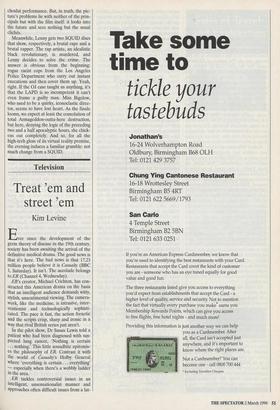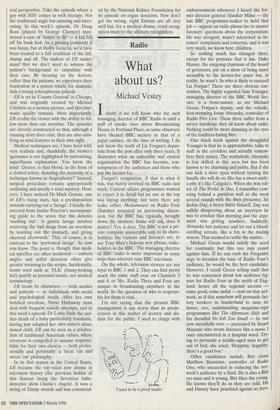Television
Treat 'em and street 'em
Kim Levine
Ever since the development of the germ theory of disease in the 19th century, society has been awaiting the arrival of the definitive medical drama. The good news is that it's here. The bad news is that 17.23 million people believe it is Casualty (BBC 1, Saturday). It isn't. The accolade belongs to ER (Channel 4, Wednesday).
ER's creator, Michael Crichton, has con- structed this American drama on the basis that an intelligent audience demands witty, stylish, unsentimental viewing. The camera- work, like the medicine, is intrusive, inter- ventionist and technologically sophisti- cated. The pace is fast, the action frenetic and the scripts crisp, sharp and ironic in a way that rival British series just aren't.
In the pilot show, Dr Susan Lewis told a Patient who had been diagnosed with sus- pected lung cancer, `Nothing is certain • • . nothing.' This little soundbite epitomis- es the philosophy of ER. Contrast it with the world of Casualty's Holby General where `everything is certain . . . everything' — especially when there's a wobbly ladder in the area.
ER tackles controversial issues in an intelligent, unsensationalist manner and approaches often difficult issues from a lat- eral perspective. Take the episode where a guy with HIV comes in with hiccups. Not the traditional angle but amusing and inter- esting. In this week's episode, Dr Doug Ross (played by George Clooney) men- tioned a case of 'failure to fly' — a kid fell off his bunk bed. As a passing comment it was funny, but at Holby General, we'd have been treated to a full rendition of the fall, thump and all. The makers of ER under- stand that we don't need to witness the patient's background to empathise with their case. By focusing on the doctors, rather than the patients, we experience their frustration at a system which, for example, fails a young schizophrenic patient.
ER is set in 'County General' in Chicago, and was originally created by Michael Crichton as a motion picture, and this cine- matic quality remains. Most importantly, ER credits the viewer with the ability to fol- low more than one storyline. The episodes are cleverly constructed so that, although a running story does exist, they are also satis- fying as mini features in their own right.
Medical techniques are, I have been told, very realistic and, thankfully, the viewer's ignorance is not highlighted by patronising, superfluous explanation. You know the kind: 'Doctor, is that blood, in the form of a clotted artery, denoting the necessity of a technique known as Angioplastry?' Instead, surgical procedure remains appropriately confusing and mostly a total mystery. How- ever, I have noticed Dr Mark Greene, one of ER's rising stars, has a predisposition towards carrying out a `lavage'. I finally dis- covered from Janine Pourroy's accompany- ing guide to the series that this denotes `washing out': 'A gastric lavage involves removing the bad drugs from an overdose by washing out the stomach, and giving charcoal afterwards.' This, of course, is in contrast to the 'peritoneal lavage'. So now you know. The point is, though, that medi- cal specifics are often incidental — camera angles and artful direction often give greater meaning to the scripts. Incidentally, terms used such as `FLK' (funny-looking kid) qualify as personal insults, not medical terminology.
ER treats its characters — both medics and patients — as individuals with social and psychological needs. After her own botched overdose, Nurse Hathaway must deal with frequent suicide attempts, and in this week's episode Dr Lewis finds the sud- den death of a baby particularly traumatic, having just adopted her own sister's aban- doned child. ER can be seen as a celebra- tion of traditional American values, where everyone is compelled to assume responsi- bility for their own choices — both profes- sionally and personally: a 'treat 'em and street 'em' philosophy.
In its first season in the United States, ER became the top-rated new drama in television history (the previous holder of this honour being the Seventies babe- detective show Charlie's Angels). It won a string of Emmy awards and was commend- ed by the National Kidney Foundation for its episode on organ donation. Now don't get me wrong, eight Emmys are all very well but, for a medical drama, renal recog- nition must be the ultimate recognition.



































































 Previous page
Previous page